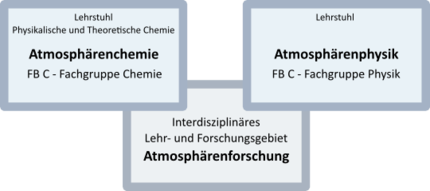Atmospheric chemistry
Atmospheric chemical processes are of great importance for life on Earth, as air and life quality are decisively influenced by them. Thus, e.g. Light-induced chemical reactions are responsible for the formation of photooxidants such as ozone in the so-called "summer smog". In these light-induced reactions so-called "radicals" are formed, which degrade harmful substances in the atmosphere. The OH radical, to be classified as the most important in this case, is thus also referred to as the "detergent" of the atmosphere. Due to the great importance of the OH radicals, a focus in physical chemistry (PC) in Wuppertal is the identification and quantification of new OH radical sources. Further examples of important atmospheric-chemical processes are the so-called "ozone hole" and the "acid rain" caused by heterogeneous chemical processes.
Important instruments of atmospheric chemistry in Wuppertal are laboratory studies, field measurements, emission measurements, method development and modeling as well as their connections. In laboratory studies, atmospheric-relevant reactions are examined under controlled conditions and the findings are used as a basis for field measurements and modeling. In the field measurements, one tries to track complex processes and then describe them using the modeling. If this is successful, the models allow a certain prediction of future conditions in the atmosphere, and recommendations can be made on the basis of the obtained knowledge, e.g. for emission reductions, which can then be checked with the aid of emission measurements. For the measurements in the laboratory and in the field, sensitive measuring devices are still required, some of which are developed in the PC (see method development). For this reason, the close interlocking of these instruments is important, since, for example, the development of new, sensitive measuring devices can lead to unexpected observations in field measurements and then initiate new laboratory and model studies. An example of the successful linking of the above-mentioned instruments is the so-called "ozone hole", which was first observed unexpectedly in field measurements, initiated the discovery of new reactions in the laboratory and ultimately led to the reduction of emissions of fluorine-chlorinated hydrocarbons involved after successful modeling of the processes.
At the Bergische Universität Wuppertal in Nordrhein-Westfahlen you will find a unique constellation of research fields in relation to the atmosphere. On the one hand, in the Chemistry section the AG atmospheric chemistry at the Department of Physical and Theoretical Chemistry, as well as the Chair of Atmospheric Physics at the Department of Physics. The interdisciplinary field of atmospheric research is the result of the the co-operation between the two chairs. Interdisciplinary activities are coordinated and advanced in particular.

Atmospheric research is also part of the environmental forum at the Bergische Universität, in which, in addition to atmospheric questions, other environmental aspects such as, for example, Land, water, transport, security, economics, etc. are considered.
Furthermore, the research group "The Reacting Atmosphere - Understanding and Management for Future Generations" was recently co-funded by the Bergische Universität Wuppertal together with the Wuppertal Institute for Climate, Environment and Energy, Forschungszentrum Jülich and the Rheinische Institut für Umweltforschung at the University of Cologne which is to bring together essential activities in NRW in this area.
In addition, there is a research focus in the Chemistry research group, which is Molecular Environmental Chemistry; This is also one of the chooseable main focuses of the Master of Science (Chemistry) program. A number of professorships from the Department of Chemistry and Biology are participating here:
- Analytical chemistry (detection of trace substances in air and water, water chemistry)
- Inorganic Chemistry (Chemistry of Halogen Oxides)
- Physical chemistry (laboratory and field measurements on the chemistry of the atmosphere)
- Theoretical chemistry (calculation of critical molecular structures)
- Microbiology (Biodegradation of trace substances)
